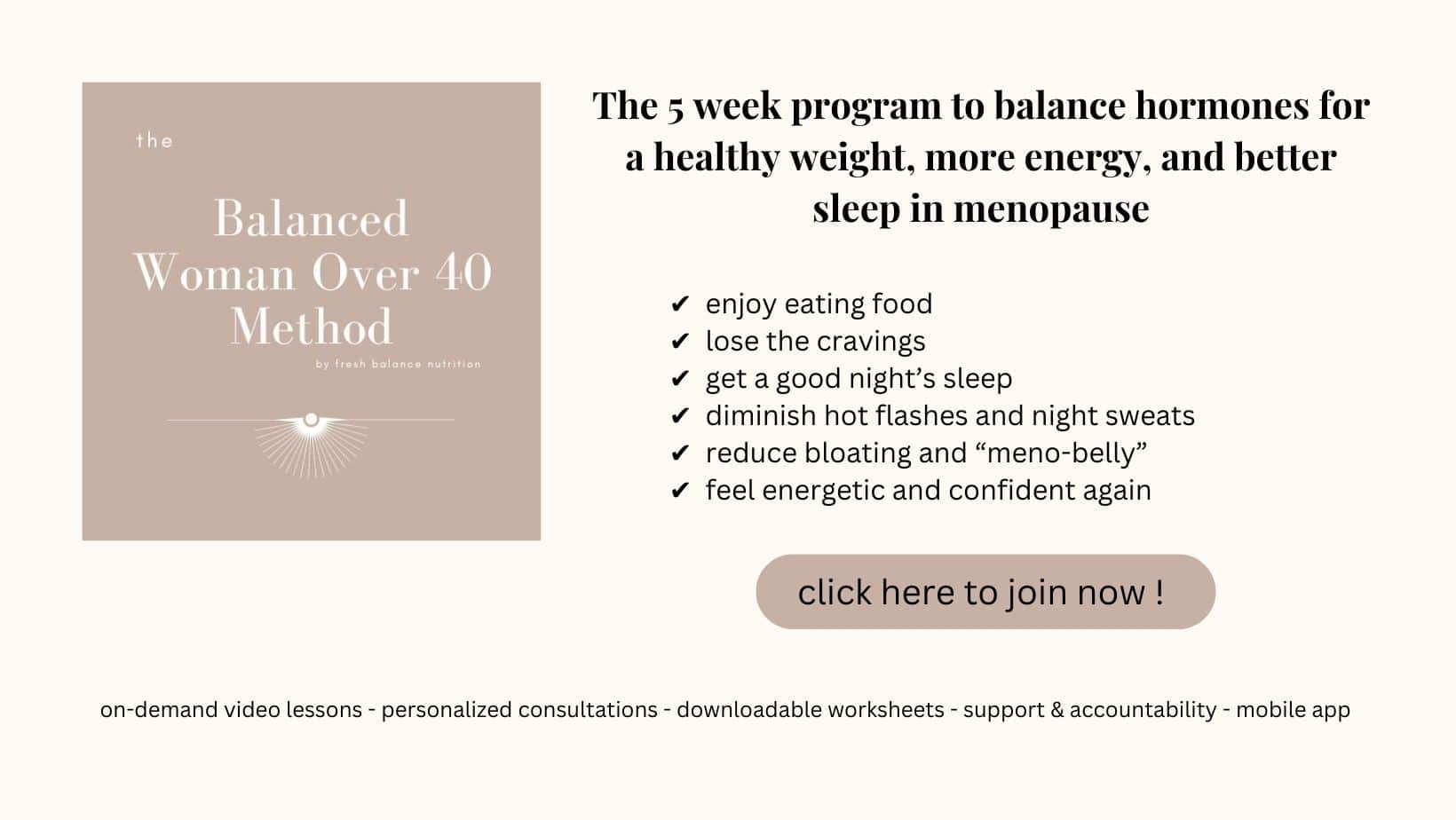Fatigue during perimenopause is coming from a whole list of sources. But where can we start making changes so we can begin to feel relief?
Why do we feel fatigued in Perimenopause?
There are several reasons we feel tired.
- Hormonal ups and downs. During perimenopause the levels of several hormones including estrogen, progesterone, adrenal hormones, and thyroid hormones begin to fluctuate. These hormones are responsible for regulating our body’s cellular energy. When they are not in sync with each other we end up exhausted because of the cascade of chaos they are causing.
- Elusive sleep. Our sleep patterns change at this time. Some of us suffer with insomnia, others fall asleep but can’t seem to stay asleep, most of us can agree sleep isn’t as restoring as it used to be. Sleep restores both our body and mind. When we are gypped out of a good sleep it just makes everything harder.
- Overwhelmed. Don’t forget we may simply be tired from just trying to “do it all”. Working, caring for kids, checking on parents, household errands, and all the other responsibilities can lead to stress and burnout. We women have a reputation for giving so much to others and we need to be reminded to sometimes give ourselves a well-deserved break, nap, massage…
- Water levels. Our thirst sensation is muted during these hormonal phases. That means if it’s hot outside, we are exercising, or we have frequent hot flashes and night sweats – we have some catching up to do. Better yet, schedule those water breaks in ahead of time so your body won’t feel fatigued from dehydration and you can feel energetic when exercising too.
- Lack of meal planning. A lousy diet can sink your ship. Take a close look at what’s fueling your body in a day. Are you planning ahead and stocking nourishing breakfasts to grab, lunches high in protein and fiber to keep your energy flowing, and balanced dinners to set you up for sleep? Or are you skipping meals, grabbing empty-calorie fast food, and eating so late your stomach is digesting instead of resting.

What can be done to avoid feeling so tired?
- Become a yogi. A regular yoga practice is very helpful to manage stress and anxiety, some of the biggest concerns in perimenopause. Yoga breathwork can help to soothe the endocrine system and certain poses support the endocrine glands.
- Stick acupuncture in your schedule. This Eastern medicine therapy is designed to balance your body’s qi or energy flow. The treatment can help women get relief from many of the symptoms of perimenopause and menopause that have a negative impact on quality of life. Many women report a more restful sleep following an acupuncture experience.
- Adopt some adaptogens. Adaptogens are made from non-toxic plants that help us to reduce our reaction to different types of stress better. They also decrease the exhaustion we might feel due to long term stress. Shisandra is a fruit and as a supplement can help to increase resistance to disease and stress. Reishi mushrooms can set us up for a more satisfying night’s sleep. Rhodiola rosea is another adaptogen that can decrease anxiety and thereby improve how we sleep.
- Cut caffeine. We all know caffeine is a stimulant and can affect our sleep routine. It seems unnecessary to warn about drinking it in the evening. But did you know decaffeinated coffee still contains some caffeine? So does chocolate, hot cocoa, and other chocolate-flavored foods, in addition to PMS and headache medications.
- Pass on alcohol. If you’re really having lousy sleep, track how often and at what time you are drinking alcohol. You may think it calms you and makes you sleepy but the problem is it interrupts the restorative REM phase of sleep. Also, it’s a diuretic so not only will you wake up at 2 am to pee, you’ll be further dehydrating yourself.
- And Speaking of Hydration. Your tired and weak feeling may actually be from being dehydrated. Plain water is the best remedy but don’t forget foods such as soup, vegetables, and fruit count towards your fluid intake too.
- Examine your diet. There are so many reasons your diet may be causing you to feel tired. Any digestive problems could be at the root of fatigue. Not eating enough or eating too much in one sitting or even eating too quickly could leave you drowsy. Grabbing unbalanced meals such as high carbohydrate meals without the blood sugar buffering effect of fiber, protein, and healthy plant fats won’t help. Inflammatory foods like sugary desserts and processed meals and snacks can mess with insulin and blood sugar levels leaving you wiped out. Planning ahead to ensure balanced meals including enough lean protein, gut healthy fiber, and anti-inflammatory plant oils is essential to building the foundation for busting fatigue.
Balanced Recommendations
Keep a journal to track the source of your fatigue and start to change habits to feel more energetic and clear headed. Clients I work with use an app on their mobile phone or computer to track food, mood, sleep, and hydration. Using this revealing information we can work together to put the pieces together for better rest and more energy. Want to talk about it? Get started now!








